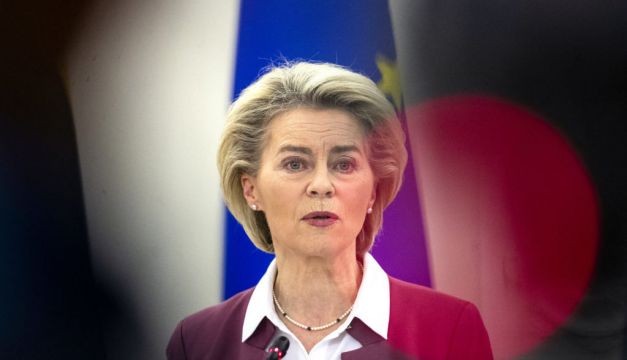The chief of the European Commission has said EU nations should consider making Covid-19 vaccinations mandatory because too many people still refuse to have them voluntarily.
The EU-wide vaccination rate is 66 per cent, and unexpectedly high case surges in much of the 27-nation bloc have led many member countries to renew mask and testing requirements, and to take other steps to curb infections.
“It is understandable and appropriate to lead this discussion now – how we can encourage and potentially think about mandatory vaccination within the European Union,” Ursula von der Leyen said.
We are now facing a double challenge in the fight against #COVID19.
The rapid resurgence of Delta across Europe and a new variant of concern: Omicron.
Full vaccination and boosters provide the strongest protection there is. And they are available now. https://t.co/FOuda4Jbvj— Ursula von der Leyen (@vonderleyen) December 1, 2021
Advertisement
Health policy remains a national prerogative in the EU, and making jabs mandatory remains a controversial issue.
“One third of the European population is not vaccinated. These are 150 million people. This is a lot,” she told reporters.
“The lifesaving vaccines are not being used adequately everywhere. This is an enormous health cost coming along.”
German chancellor-designate Olaf Scholz said he would back a proposal to mandate coronavirus vaccines for all next year.

EU nations have taken different approaches to the issue. Austria pledged to mandate vaccines for all residents beginning on February 1st, while Greece plans to fine people aged 60 and over €100 per month if they do not get vaccinated, starting in mid-January.
“The data is irrefutable: nine out of 10 Greeks who lose their lives [to Covid-19] are over the age of 60 and more than eight out of 10 of the people [who die] are unvaccinated,” Greek prime minister Kyriakos Mitsotakis told parliament.
Slovakia is considering paying people in that age group €500 to get vaccinated.
The EU’s 27 health ministers are scheduled to assess the emergence of the Omicron variant of coronavirus next Tuesday. Any recommendations would be put to the leaders of member nations during a regularly scheduled December 16th summit.
An emergency summit on the Omicron variant first detected in southern Africa had been discussed for days, but it was tough to find a time slot for all the leaders.

Much remains unknown about the variant, including whether it is more contagious, as some health authorities suspect, whether it makes people more seriously ill, and whether it can thwart the vaccine.
As of Wednesday, there were 59 confirmed cases involving Omicron in 11 EU nations, an increase of 15 since Tuesday.
The Netherlands has had the most cases so far with 16, and the majority had travelled to Africa, according to the European Centre for Disease Prevention and Control.







